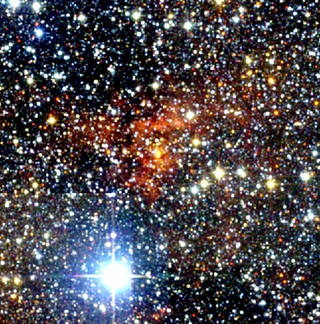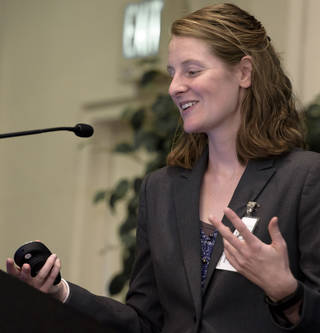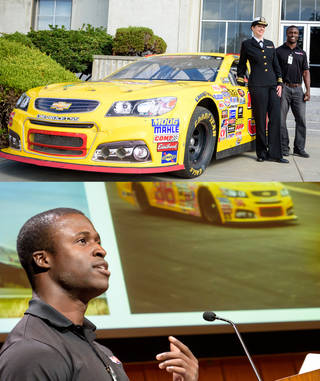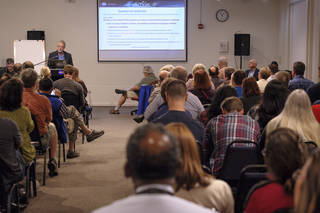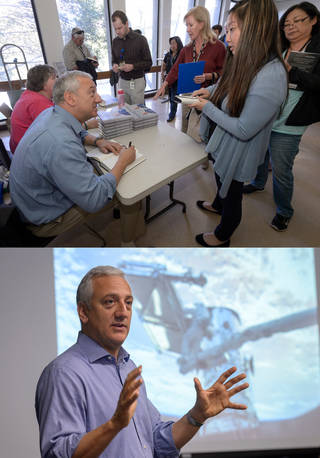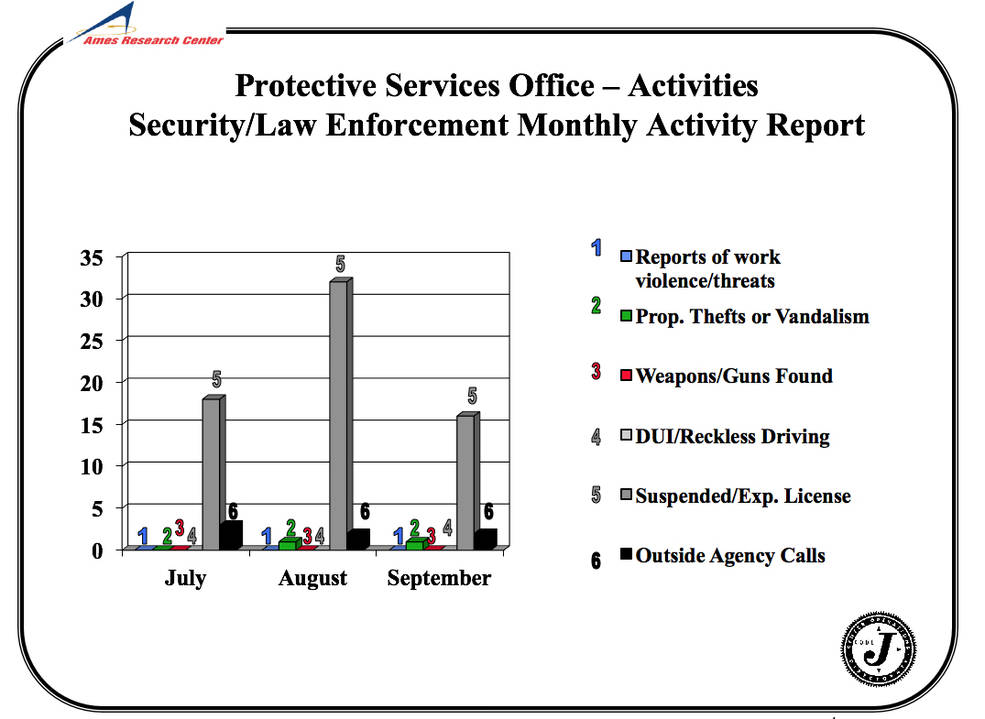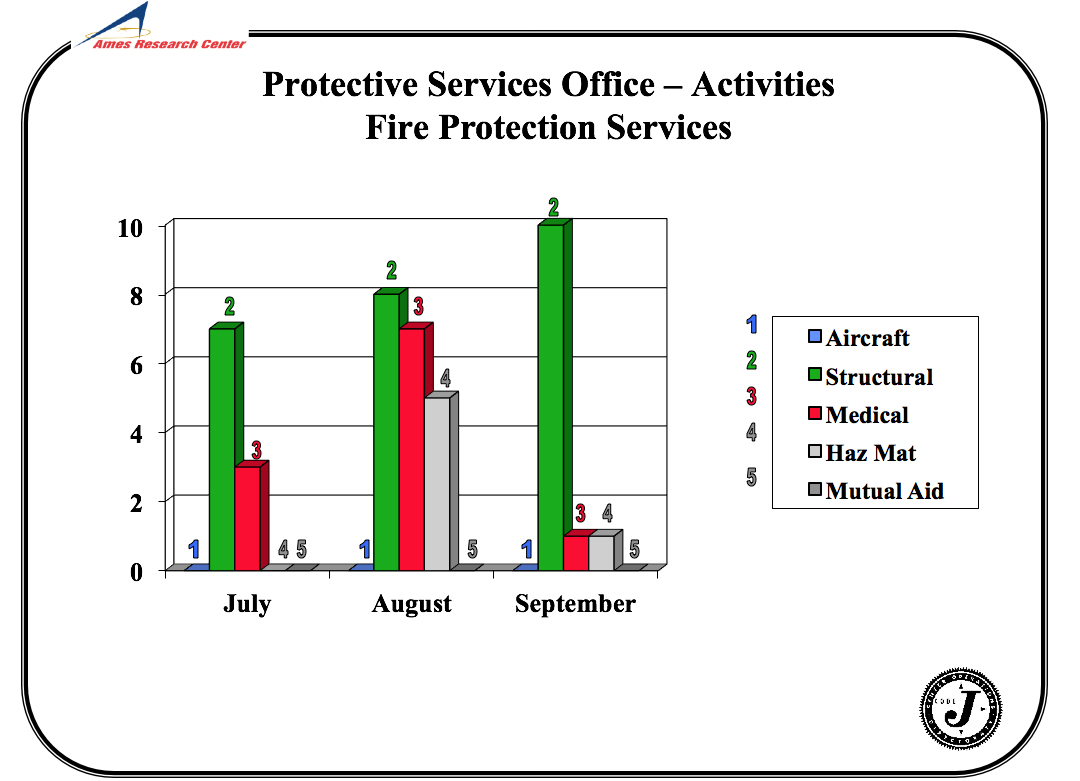NASA Conducts ‘Out of Sight’ Drone Tests in Nevada
by Sharon Lozano
Blazing a trail for safely integrating drones into the national airspace, a team from NASA’s Ames Research Center on Oct. 19 flew four uncrewed aircraft – commonly called drones – at Reno-Stead Airport in Reno, Nevada.
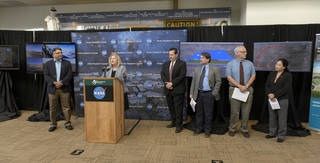
The “out of sight” tests, led by NASA in coordination with the Federal Aviation Administration and several partners, were the latest waypoint in solving the challenge of drones flying beyond the visual line of sight of their human operators without endangering other aircraft. They were part of NASA’s Unmanned Aircraft Systems (UAS) traffic management (UTM) research platform, led by Parimal Kopardekar, manager of NASA’s Safe Autonomous Systems Operations project.
NASA is with you when you fly, committed to transforming aviation by reducing its environmental impact, maintaining safety, and revolutionizing aircraft shapes and propulsion. Every U.S. aircraft and U.S. air traffic control tower has NASA-developed technology on board. Ames Research Center originally was part of NASA’s precursor, the National Advisory Committee for Aeronautics, which shaped the first 100 years of aviation in America.
During the test, two of the drones flew beyond their commanders’ lines of sight. As many as two drones were operated in the same test airspace, separated by altitude and within sight of their operators. The pilots used the NASA-developed UTM research platform to gain information about all the drones’ locations and proximity to other air traffic and hazards. UTM also informed other airspace users of potential hazards and conflicting operations that could affect their plans.
Before multiple drones can fly in the same area, beyond the pilots’ view, procedures need to be in place to safely manage the traffic. Operators must be aware of other aircraft around them, no-fly zones (also known as geo-fenced areas), and man-made and natural hazards, such as severe weather or unanticipated events in the area.
For entire feature, see: https://www.nasa.gov/feature/ames/nasa-plans-first-beyond-visual-line-of-sight-drone-demonstration-in-nevada
Employees Recognized at 2016 Ames Honor Awards Ceremony
The honorees received their awards at a ceremony on Sept. 29, 2016. Thanks to every employee who submitted a nomination this year and congratulations to these deserving employees listed below:
2016 Ames Honor Awardees
Administrative Professional
Robert M. Benion
Sharon Lozano
Beatrice M. Morales
Nina M. Rich
Umetria Thomas
Commercialization/Technology Transfer
David L. Iverson
Stevan Spremo
Contractor Employee
Thomas S. Barclay, Bay Area Environmental Research Institute
Eduardo A. Bendek, Bay Area Environmental Research Institute
Cynthia J. Freedman, USRA
Ramprasad Gandhiraman, USRA
Joel A. Hernandez, Millennium Engineering & Integration Co.
Christina Ngo, AerospaceComputing, Inc.
Alejandro Perdomo-Ortiz, USRA
David L. Rodriguez, Science & Technology Corp.
Jonathan G. Sasaki, Millennium Engineering & Integration Co.
William M. Toscano, Deltha-Critique
Diversity and Opportunity
Krisstina Wilmoth
Education and Outreach
Michael J. Fletcher
Engineer
Stephen Dunagan
Brandon P. Smith
Group/Team
ADEPT Ground Test Team
Ames Capability Leadership Team (CLT)
Ames Exploration Encounter Planning and Implementation Team Cube Quest Challenge Team
EFT-1 Postflight Analysis and Avocoat Extraction Team Exploration Medical Capability Electrocardiogram Test FFC Upgrade Team
K2 Mission Guest Observers Office Team
Kepler’s Recovery Team
Super Bowl 50 Support Team
WetLab-2 ISS Payload Team
Mentor
James C. Ross
William Warmbrodt
Project Management
Maura Fujieh
Julie Schonfeld
Scientist or Researcher
William B. Toscano
Special Appreciation
Brienne Shkedi, Johnson Space Center
Student
Natalie N. Ball
Brendan E. Short
Jason Watkins
Supervisor/Manager
Kenneth Ashford
John Hogan
Sustainability
Rose A. Grymes
Technical Support/Professional
Vincent Derilo
Robert A. Duffy
SOFIA Detects Collapsing Clouds Becoming Young Suns
by Nicolas Veronico
Researchers on board NASA’s Stratospheric Observatory for Infrared Astronomy, SOFIA, observed the collapse of portions of six interstellar clouds on their way to becoming new stars that will be much larger than our sun.
When a gas cloud collapses on itself, the cloud’s own gravity causes it to contract and the contraction produces heat friction. Heat from the contraction eventually causes the core to ignite hydrogen fusion reactions creating a star.
Astronomers are excited about this SOFIA research because there have been very few previous direct observations of collapse motion. These SOFIA observations have enabled scientists to confirm theoretical models about how interstellar clouds collapse to become stars and the pace at which they collapse. Actually observing this collapse, called “infall,” is extremely challenging because it happens relatively quickly in astronomical terms.
“Detecting infall in protostars is very difficult to observe, but is critical to confirm our overall understanding of star formation,” said Universities Space Research Association’s Erick Young, SOFIA Science Mission Operations director.
For the entire feature, please visit: https://www.nasa.gov/feature/sofia-detects-collapsing-clouds-becoming-young-suns
In Memoriam…
Anthony (Tony) Gross Passes Away
Anthony (Tony) Robert Gross, 76, a senior executive at NASA Ames, died Sept. 14, 2016, surrounded by family and friends, after a brief illness. Born and raised in Philadelphia, Tony earned a BS in electrical engineering from Pennsylvania State University, an MS in electrical engineering from the University of Pennsylvania and an MS in aeronautical engineering from the University of Michigan. He did post-graduate work with the Stanford University/NASA Honors Co-op Program, and was a fellow at the famed von Karman Institute for Fluid Dynamics in Belgium. In 1967, Tony joined NASA Ames, where more than an outstanding 48-year career he held positions ranging from wind tunnel engineer to senior management in NASA’s space and aerodynamics programs. Known for his intellectual prowess, quick wit and unfailing good humor, Tony led complex projects and authored and co-authored a great many technical publications. He received many awards, and was proudest of the “Silver Snoopy Award” granted to him by NASA space shuttle astronauts for his contributions to shuttle safety. As an Associate Fellow of the American Institute of Aeronautics and Astronautics (AIAA), Chair of the Ancient Interface and a member of the International Astronautical Federation, he presented papers at major conferences world-wide. Tony was an expert photographer, an avid competitive sailor and an enthusiastic home chef who loved fine wine and innovative food. Tony is survived by his wife of 45 years, Madeleine M. Gross; his sister, Marjorie Samoff; his cousin Amy Pennington; a loving extended family; and by his closest friends, Charles and Deryl Castellano. In lieu of flowers, please consider a donation to the World Wildlife Fund.
Weaver of Disability Rights Advocates Discusses Workplace Disability Rights
The Ames Disability Advocates (ADA) hosted Meredith Weaver Oct. 19, 2016, to speak about the fundamentals of disability discrimination in the employment context. Weaver is a staff attorney at Disability Rights Advocates (DRA), one of the leading nonprofit disability rights legal centers in the nation. DRA’s mission is to advance equal rights and opportunity for people with all types of disabilities nationwide. Weaver’s presentation covered the fundamentals of disability discrimination in the employment context, including the relevant laws and regulations and how they have evolved since the ADA was enacted more than 25 years ago. She discussed a number of “hot topic” issues in employment discrimination including what kind of medical exams an employer is allowed to require at different stages of employment, when and how employers may use employment entrance exams and when disciplining anger in the workplace may actually constitute discrimination due to a disability. She also discussed relevant proposed laws and regulations.
“NASCAR Meets NASA” Presented by LT Jesse Iwuji
“NASCAR Meets NASA” was presented by LT Jesse Iwuji on Oct. 18, 2016 at Ames. From rockets to racecars, the similarities between NASA piloting and NASCAR driving are immense. NASCAR and NASA cross paths in many ways that many have not truly noticed. When considering aeronautics, safety, human factors and computing for example, there are parallels between aero design, in-cabin settings adjustments, vehicle safety equipment, pilot/driver personal protective equipment, radio communication and training. On the personal side, both astronauts and racecar drivers experience immense challenge and adversity, which is overcome by courage and fortitude. This presentation examined and compared the sequence of an evolution for a driver from the beginning of race week until the end of a race with sequence of an evolution for a pilot from the beginning of their “flight week” to the end of their space travel. The personal journey from Navy to NASCAR to NASA was shared. At a young age, Dallas, Texas native and Nigerian-American, Iwuji was interested and driven in the sporting world. Being a Texan, football naturally took its course in his life and landed him a full ride scholarship to one of the nation’s top universities, the US Naval Academy. There he played NCAA Division 1-A College football four years, graduated with a bachelors of science and was commissioned as a Surface Warfare Officer in the US Navy. Currently, he still is active duty as an officer at Naval Post Graduate School and he has been on two Arabian Gulf deployments totaling out to 15 months of deployment time on two different naval ships. Outside of the Navy, he has always had a passion in Motorsports. In 2013, he was featured in Hot Rod Magazine twice for 200+ MPH and world record accomplishments in the Modern HEMI drag racing world and was on the cover of MoparMax magazine. He also began his road course racing ventures doing open track days and became a SCCA member. 2015 was Iwuji’s first official stockcar racing season and he began it in the NASCAR Whelen All-American Series at Irwindale Speedway. From late model stockcars, he transitioned toward the end of 2015 into the NASCAR K&N Pro Series where he is now competing in his rookie 2016 season for Patriot Motorsports Group and ranked 10th of nearly 60 drivers. He also is involved in advocacy and outreach, supporting charitable events and organizations.
Ames Exchange Hosts it’s Popular Annual Chili Cook-off, with “ChiliCon” Theme
The Ames Exchange hosted it’s 19th annual Chili Cook-Off on Oct. 6, 2016 with “ChiliCon” as the theme. Participants dressed up as comic book and superhero characters and were quite creative at doing so. Attendees sampled chili and cast their vote for the ‘People’s Choice’ award. A select panel of judges awarded other categories with trophies presented to the winning team in each category.
Town Hall Shares Information on Vapor Intrusion Studies, Worker Health Concerns
The meeting was held at Ames Oct. 19, 2016, in Building 3 for the purpose of sharing information with NASA Ames employees regarding government agency responsibilities related to worker health concerns, indoor air quality, groundwater contamination plume areas and potential vapor intrusion concerns. Representatives from NASA (Codes JQ and QH), the Federal Occupational Safety and Health Administration (OSHA), the Environmental Protection Agency (EPA) and the Agency for Toxic Substances and Disease Registry (ATSDR) presented information and answered questions about their roles and involvement with these important worker health issues and concerns. Employees heard about recent NASA industrial hygiene and environmental vapor intrusion studies, OSHA inspections and air monitoring and EPA vapor intrusion studies and regulatory oversight of the MEW and NAS Moffett Field Superfund Sites. ATSDR provided information about Amyotrophic Lateral Sclerosis (ALS) and the National ALS registry.
Astronaut Mike Massimino Describes his Work on Final Hubble Telescope Servicing Mission
The Hubble Space Telescope was launched in 1990 and was serviced by astronauts on board the space shuttle five times. Former astronaut Mike Massimino’s presentation focused on the final Hubble Space Telescope Servicing Mission, STS-125, which took place in May 2009 on board space shuttle Atlantis. During that mission, the crew upgraded the telescope through a series of five spacewalks, setting a record for space walking time on a single space shuttle mission. The spacewalks included the first ever repair in place of Hubble science instruments. Massimino served as a NASA astronaut from 1996 to 2014. A veteran of two space flights to the Hubble Space Telescope, he and his crews set team records for spacewalking time, and he became the first person to tweet from space. He has played himself on the CBS sitcom The Big Bang Theory, was featured in the IMAX film Hubble 3D, and has appeared frequently in television documentaries and on late-night talk shows and news programs. A graduate of Columbia University and MIT, Massimino currently lives in New York City, where he is a professor at Columbia and an advisor at the Intrepid Sea, Air and Space Museum. He is the author of Spaceman: An Astronaut’s Unlikely Journey to Unlock the Secrets of the Universe, published by Crown Archetype in October 2016, which was available for purchase at the talk and which he also autographed for employees.
Portrait Unveiling of Former Ames Center Director S. Pete Worden

On Oct. 24, 2016, employees were invited to the unveiling of the portrait of former Ames Center Director S. Pete Worden in the lobby of Building 201. This was followed by an informal reception in Building 200. Hans Mark, Ames’ Center Director from 1969 to 1977, was invited as the guest speaker. After the unveiling of Worden’s portrait, it was hung on the second floor of Building 200, along with all of the portraits of Ames’ former center directors.
A statistical summary of activities of the Protective Service Division’s Security/Law Enforcement and Fire Protection Services units for the period ending September 2016 is shown below.
Click here to view:
Ames Ongoing Clubs/Monthly Events
NASA Ames Exchange Information
Information about products, services and opportunities provided to the employee and contractor community by the Ames Exchange Council. Visit our web site at: http://exchange.arc.nasa.gov
Beyond Galileo Gift Shop N-235 in the cafeteria, 8:00 a.m. – 2:00 p.m., ext. 4-6873
Visitor Center Gift Shop (Exploration Center), Tues-Fri, 10:00 a.m. – 4:00 p.m., Sat. – Sun, noon – 4:00 p.m., ext. 4-5412 Remember to purchase your baby shower, birthday and holiday gifts at Ames’ two gift shops!
Mega Bites Cafeteria N-235, Manager Jason Hamed, ext. 4-5969, Mon – Fri, 6:00 a.m. – 2:00 p.m., ext. 4-5969/Catering contact Karen Mcintyre, 650 444-2241
The SpaceBar: Subs & Burgers, Bldg. 3, Hours are: Mon – Fri, from 11:00 a.m. – 7:00 p.m. See: http://exchange.arc.nasa.gov/cafe/menu.html for menu items.
NASA Lodge (Bldg. 19) (650) 603-7100 Where to stay when you’re too tired to drive home? What about the lodge?! Current Rates: Bldg. 19 (43 rooms), rate: $65/night ($5 each additional adult); Bldg. 583 A&B (150 rooms), rate: $55/night ($5 each additional adult); B547 rate $60/night (for large groups)
Ames Swim Center (N-109) (650) 603-8025 The swimming pool is now open. Hours of operation are as follows (lap swim only): Mon – Fri, 10:00 a.m. – 1:00 p.m. and M-F 3:00 p.m. – 6:00 p.m. The pool is heated year round. POC: Ryan Storms, pool manager (650) 603-8025. Memberships: Yearly access $350, 3 Month $100, Single day use $5
Exchange Basketball Gym, Building 2, POC: Manager Bryan Henshaw, (650) 603-9717, Hours of operation: Mon – Fri, 11:00 a.m. – 1:30 p.m. and M-F 4:00 p.m. – 7:00 p.m. The basketball gym is a full NBA regulation size court and is free to use.
RV lots available. Call to reserve a space at (650) 604-0698. Civil Servants and Active Military $50/month. Contractors and Retired Personnel $100/month
Chase Park reservations, call ext. 4-4948NACA Park reservations, call ext. 4-4948
Ames Emergency Announcements
To hear the centerwide status recording, call (650) 604-9999 for information announcements and emergency instructions for Ames employees. You also may listen to 1700 KHz AM radio for the same information.
Ames Cat Network
The Ames Cat Network needs help finding homes for cats trapped at Moffett. They range from feral to abandoned/lost pets. They are tested, altered and inoculated. Call Iris at ext. 4-5824 if you or someone you know are interested in fostering or adopting a cat.
National Aeronautics and Space AdministrationAmes Research Center Moffett Field, CA 94035-1000
The Ames Astrogram is an official publication of Ames Research Center, National Aeronautics and Space Administration. Managing Editor: Matthew Buffington Editor, Layout and Design: Astrid Albaugh Employees can reach the Astrogram Office via email at: astrogram@mail.arc.nasa.gov or by phone at ext. 4-3347.






























